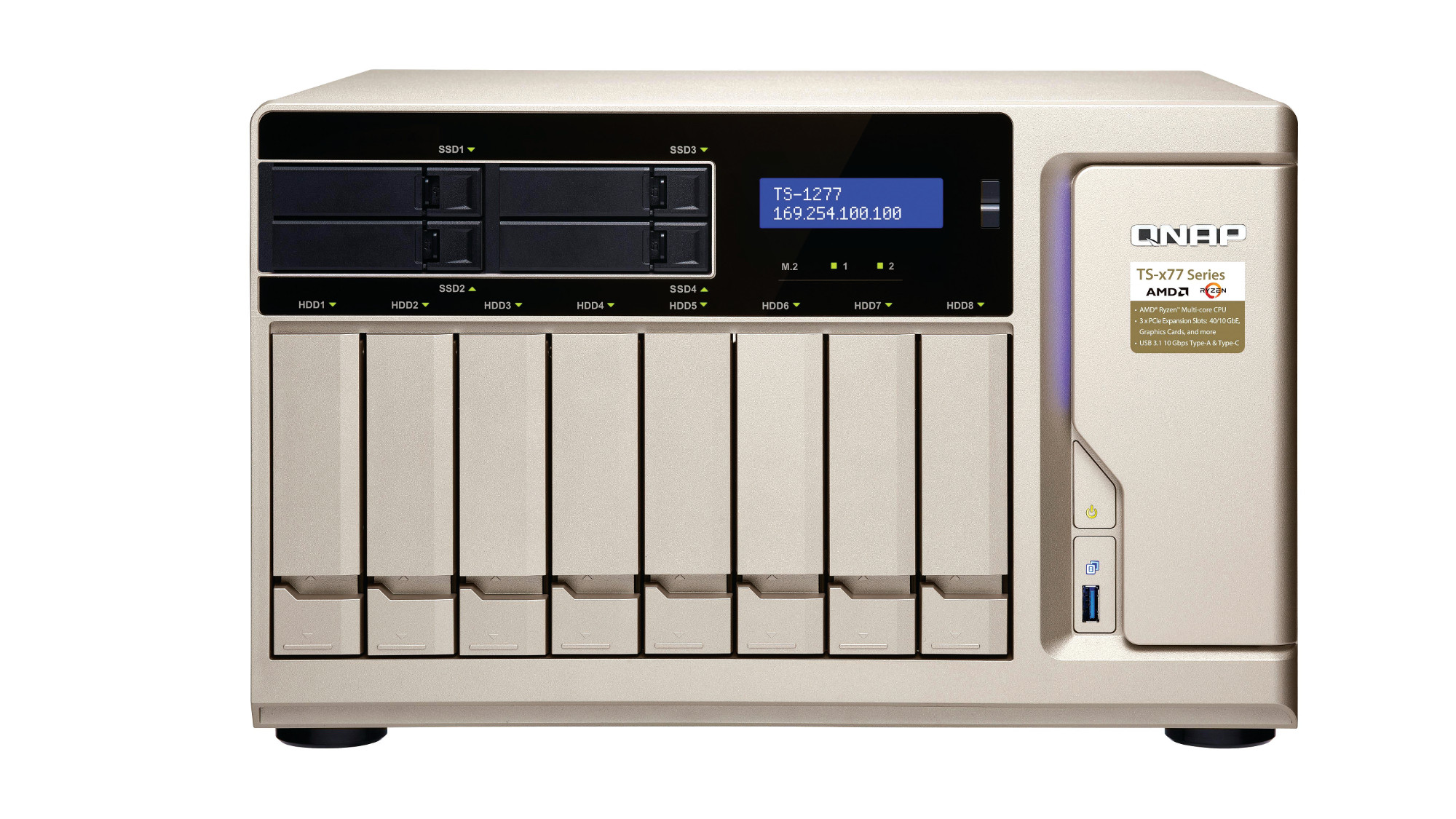Qnap TS-1277 review
The first Ryzen-powered NAS appliance delivers top performance and unprecedented storage and data protection features


The Qnap TS-1277 is an immensely powerful desktop NAS appliance that sets the gold standard for design. Its Ryzen CPU delivers excellent 10GbE performance, there's plenty of room for future growth and Qnap's latest QTS software delivers a superb range of data protection features.
-
+
Amazing power; Great performance; Heaps of storage features
-
-
Outer expansion slots are restricted to 150mm lengths

Qnap's TS-1277 is the first desktop NAS appliance in the world to sport AMD's Ryzen CPU and it looks to have more features than any other at this price point. This big golden box offers eight hot-swap LFF drive bays for general data storage, four SFF bays for performance-enhancing cache duties, dual internal M.2 SSD slots and three PCI-Express expansion slots.
There's more; along with quad Gigabit, you have six standard USB 3 ports and even two 10Gbps USB 3.1 ports presented as Type-A and Type-C sockets. Costing 2,514, our review model has an 8-core 3GHz Ryzen 7 1700 CPU and 16GB of DDR4 memory expandable to 64GB, but you can save over 400, as Qnap offers a version with a 6-core 3.2GHz Ryzen 5 1600 CPU and 8GB of memory.
Internal cooling is exemplary - the CPU has a large passive heatsink partnered by two blower modules while the chassis has three fans at the rear. There are very quiet, with the SPLnFFT iOS app on our iPad recording sound levels of only 38dB at one metre in front.
For high-performance testing, we fitted four 10TB Seagate IronWolf NAS drives in the tool-free carriers and installed an Emulex dual-port 10GBase-T adapter. As this card is 167mm long, it would only fit in the single inner expansion slot -- the upper CPU blower unit restricts card lengths in the outer two slots to 150mm.
Deployment is a cinch as Qnap's QFinder utility discovered the appliance on our network and offered to set it up. For storage configuration, we opted for a big 27TB RAID5 thin storage pool so we could create multiple volumes with thin provisioning.
On first contact, you'll be greeted by Qnap's latest QTS 4.3.4 software which offers a wealth of data protection features including smart NAS share and IP SAN snapshot services. Qnap steals a march on the competition as its snapshot technology supports standard EXT4 file systems and doesn't require BTRFS.
The new Storage and Snapshots app makes light work of managing drives, storage pools, volumes, snapshots and IP SANs. Snapshots are a cinch as we chose NAS shares and iSCSI LUNs, took them on-demand and scheduled them to run at regular intervals.
Recovery is just as simple, and we restored entire NAS shares or individual files and recovered iSCSI LUNs from selected snapshots. The app can also clone a NAS share or iSCSI LUN snapshot and restore share files and folders to remote locations such as another NAS appliance.
More recovery options are provided by the updated File Station 5 which allowed us to browse the contents of NAS snapshots. Snapshot Replica is another bonus as it can secure share and LUN snapshots to remote Qnap appliances.
Cloud support is superb with the Cloud Backup Sync app supporting twelve providers and Qsync Central offering remote two-way file syncing with Windows, Mac, iOS and Android clients. After loading the Connect to Cloud Drive app, we were also able to access all our cloud storage accounts directly from the File Station 5 console.
Performance over 10GbE is excellent: a share mapped to a Dell PowerEdge R640 Xeon Scalable server delivered high sequential Iometer read and write rates of 9.2Gbits/sec and 8.9Gbits/sec. Real world speeds are also great with copies of a 25GB test file returning read and write rates of 5.1Gbits/sec and 4.8Gbits/sec.
IP SAN speeds are even better with a 500GB target returning Iometer read and write rates both of 9.2Gbits/sec. We upped the pressure with a dual 10GbE MPIO link and saw read and write speeds ramp up to 17.7Gbits/sec and 16.8Gbits/sec with the Ryzen CPU registering only 11 percent utilisation.
The TS-1277 is an immensely powerful desktop NAS appliance that sets the gold standard for design. Its Ryzen CPU delivers excellent 10GbE performance, there's plenty of room for future growth and Qnap's latest QTS software delivers a superb range of data protection features.
Verdict
The Qnap TS-1277 is an immensely powerful desktop NAS appliance that sets the gold standard for design. Its Ryzen CPU delivers excellent 10GbE performance, there's plenty of room for future growth and Qnap's latest QTS software delivers a superb range of data protection features.
Desktop chassis
3GHz AMD Ryzen 7 1700 CPU
16GB DDR4 (max 64GB)
8 x LFF/4 x SFF hot-swap SATA drive bays
2 x M.2 22110 SSD slots
Supports RAID0, 1, 5, 6, 10, 50, 60
4 x Gigabit
6 x USB 3
2 x USB 3.1
3 x PCI-Express
3.5mm audio in/out
550W internal PSU
370 x 320 x 235mm (WDH)
3yr RTB warranty
Get the ITPro daily newsletter
Sign up today and you will receive a free copy of our Future Focus 2025 report - the leading guidance on AI, cybersecurity and other IT challenges as per 700+ senior executives
Dave is an IT consultant and freelance journalist specialising in hands-on reviews of computer networking products covering all market sectors from small businesses to enterprises. Founder of Binary Testing Ltd – the UK’s premier independent network testing laboratory - Dave has over 45 years of experience in the IT industry.
Dave has produced many thousands of in-depth business networking product reviews from his lab which have been reproduced globally. Writing for ITPro and its sister title, PC Pro, he covers all areas of business IT infrastructure, including servers, storage, network security, data protection, cloud, infrastructure and services.
-
 Westcon-Comstor and Vectra AI launch brace of new channel initiatives
Westcon-Comstor and Vectra AI launch brace of new channel initiativesNews Westcon-Comstor and Vectra AI have announced the launch of two new channel growth initiatives focused on the managed security service provider (MSSP) space and AWS Marketplace.
By Daniel Todd Published
-
 Third time lucky? Microsoft finally begins roll-out of controversial Recall feature
Third time lucky? Microsoft finally begins roll-out of controversial Recall featureNews The Windows Recall feature has been plagued by setbacks and backlash from security professionals
By Emma Woollacott Published
-
 The UK government wants quantum technology out of the lab and in the hands of enterprises
The UK government wants quantum technology out of the lab and in the hands of enterprisesNews The UK government has unveiled plans to invest £121 million in quantum computing projects in an effort to drive real-world applications and adoption rates.
By Emma Woollacott Published